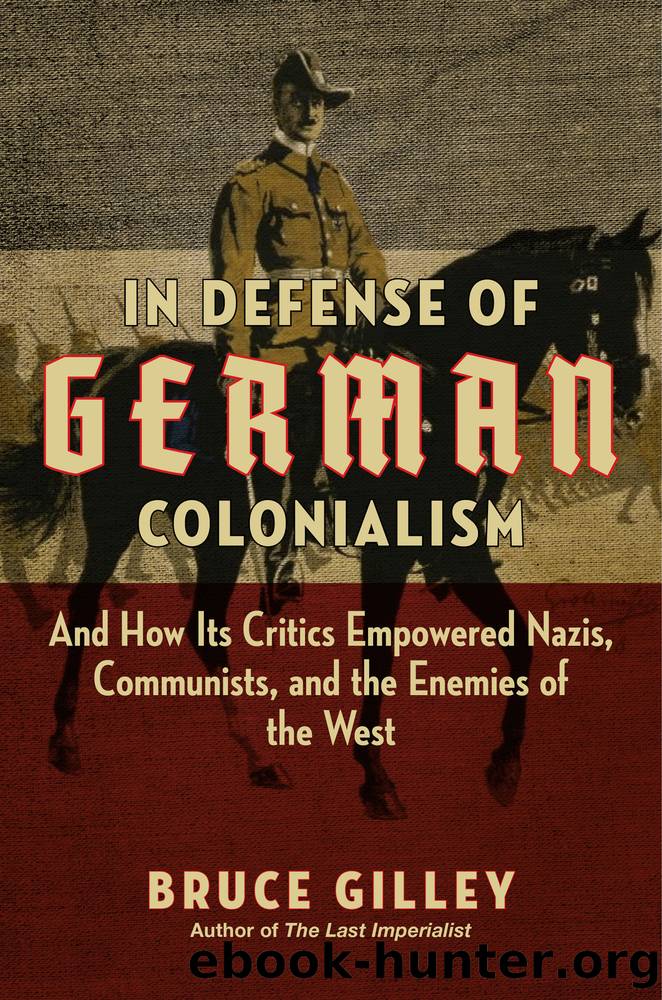In Defense of German Colonialism by Bruce Gilley

Author:Bruce Gilley
Language: eng
Format: epub
Publisher: Regnery Gateway
Published: 2022-08-02T00:00:00+00:00
The commoners, meanwhile, happily migrated en masse to the city. Many more would have come but for limits set on residency rights. Those who were unable to move did everything to avail themselves of the weal of Qingdao. Chinese from outside the colony voluntarily brought their disputes to be decided by a German judge whose rulings in theory had no legal force.13 Chinese parents clamored to send their children to the Sino-German College (Hochschule), opened in 1909, the first institution of higher education in a German colony.
Alas, a German middle-school textbook used today takes the migration not as evidence of the legitimacy and appeal of German rule but of the dark forces guiding the whole project: racial mixing was allowed in the colony only because of âthe economic benefitsâ; the thousands of jobs given to formerly poor Chinese âled to class differences within the Chinese populationâ; rising âanti-German sentimentâ in Qingdao was the cause of the virtuous and progressive Boxer Rebellion. And so on.14
Not surprisingly, sporadic strikes and boycotts organized by the Chinese Business Association in Qingdao in 1908â10 have been seized upon by some scholars as evidence of âanti-colonial resistanceâ and ârising nationalism.â The truth, as one Hong Kong scholar shows, is more prosaic: they were mafia tactics used by the nearby provincial governor to negotiate better terms on railway development and trade with the Germans.15
After a new Republic of China emerged from the rot of the Qing in 1912, the first president and âfather of modern China,â Sun Yat-sen, visited Qingdao at the invitation of the local Chinese chamber of commerce. Toasts of ganbei! (empty your glass!) were made over bottles of German âTsingtao Beer.â16 Sun lavished praise on the German colonial venture. Qingdao under German rule, he said, was a âsplendid cityâ that should be a model for all of China: âIn three thousand years, China did not achieve in [Qingdao] what Germany has done in fifteen years,â he said, echoing comments he would later make about Hong Kong under British rule.17 âIf every local government in China would send ten people to visit Qingdao and learn about its administrative management, town, streets, wharves, harbors, university, forestation, public works, and government, China would benefit greatly.â18 He scolded Chinese students in Qingdao who had boycotted classes to protest the German insistence that Sun be treated as only a âprivate citizenâ because he had recently stepped down as president, telling them to return to class to âhelp to modernize China.â He left clutching copies of books published by the commissioner for local affairs, Wilhelm Schrameier, on land policy, port operations, and public administration.19
A decade later, Sun invited Schrameier to the southern province of Guangdong to formulate a land-reform policy. Schrameier shared his experiences of land reform with Sunâs son, who was mayor, before dying in a car accident in the city.20 Sun Jr. was convinced that the German land policies, which put land into the hands of peasant farmers, were the key to economic success.21 That insight would travel
Download
This site does not store any files on its server. We only index and link to content provided by other sites. Please contact the content providers to delete copyright contents if any and email us, we'll remove relevant links or contents immediately.
The Secret History by Donna Tartt(19034)
The Social Justice Warrior Handbook by Lisa De Pasquale(12183)
Thirteen Reasons Why by Jay Asher(8885)
This Is How You Lose Her by Junot Diaz(6873)
Weapons of Math Destruction by Cathy O'Neil(6261)
Zero to One by Peter Thiel(5782)
Beartown by Fredrik Backman(5734)
The Myth of the Strong Leader by Archie Brown(5495)
The Fire Next Time by James Baldwin(5426)
How Democracies Die by Steven Levitsky & Daniel Ziblatt(5211)
Promise Me, Dad by Joe Biden(5141)
Stone's Rules by Roger Stone(5080)
A Higher Loyalty: Truth, Lies, and Leadership by James Comey(4947)
100 Deadly Skills by Clint Emerson(4914)
Rise and Kill First by Ronen Bergman(4776)
Secrecy World by Jake Bernstein(4739)
The David Icke Guide to the Global Conspiracy (and how to end it) by David Icke(4697)
The Farm by Tom Rob Smith(4501)
The Doomsday Machine by Daniel Ellsberg(4482)
